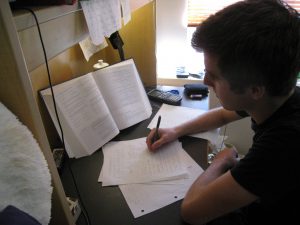
What messages do assessments give students?
“Every act of assessment gives a message to students about what they should be learning and
how they should go about it.” (Boud, 1995, p. 2)
This statement from David Boud in one of his early papers critiquing traditional assessments reveals the main challenges in implementing effective formative assessments in a university course.
Thinking about this question can lead to the following frequently discussed conundrums faced by university educators:
- Should I award marks for formative assessment? If so, how can I do this in a way that will not interfere with deeper learning and enquiry by the student – won’t they become strategic about this assessment, getting information from each other and a range of online sources to maximise their grade, rather than deeply engaging in the task? How can I stop them from “cheating?”
- If I don’t award marks for formative assessments, how can I motivate my students to engage with them? Students will only put effort and attention on to assessments that “count” towards their final grade!
- How can I avoid fragmentation of learning and provide holistic, progressive assessment tasks, when the grading system requires me to separate out tasks and nominate them as “final grades” that provide a basis for accreditation and/or graduation of the student?
Discussion: What do you think?
Share your thoughts on these common questions that arise in assessment design in university courses, and any solutions you have found.
Unintended consequences
“A task which is intrinsically interesting and which may be approached meaningfully at any other
time may be given short shrift when it is located among a thicket of examinations.” (Boud, 1995, p. 3)
Boud has stressed in his papers that assessment can drive surface and strategic approaches to learning or deeper approaches to learning, depending on the assessment messages they receive. Students develop beliefs about how to prepare for assessments based on past experience. This means that even if the teacher tries to design holistic assessment for deeper learning, students who have in the past succeeded in passing passive, transmission style assessments, will persist with a surface and strategic approach to learning. Assessment thus has a “compounding effect” on the learning habits of students (Boud, 1995, p.3).
Boud also critiques the power dynamics and its associated language around assessment in university education, as follows:
Traditional assessment methods assume traditional power relationships between student and teacher/assessor. “The very act of a person or authority making unilateral and final judgements over another has major consequences for learning” (1995, p. 5). This is not conducive to producing autonomous and interdependent learners.
Boud points out that students are often damaged by the “over-exercise of power”. Learning is a “vulnerable state” – the distinction between giving feedback on a product of the student and judging them as a person must be kept in mind. “Rich statements of competence” rather than “final vocabulary” are important (for example, vocabulary that has a “final” tone to it might be “this is unprofessional work” or “this is definitely not a pass” or “fail!”). Assessment should be a continuing dialogue during the learning process, on the assumption that the student can learn and improve, rather than a one-off event after a period of study ( 1995, p. 6).
With a more holistic approach the assumptions about power dynamics, and the use of language, must be challenged.
Making assessments participatory and democratic
Boud and others have written further on this power imbalance and how to implement more participatory and democratic assessment processes in a recent article, where the importance of developing student skills in assessment and evaluation of themselves and others is emphasised (Ibarra-Saiz et al 2020).
Some tools and methods for a more continuing, reflective and holistic assessment process include the use of portfolio assessment and ePortfolios which enable reflective journals and works in progress to be displayed to assessors, as well as a showcase of final products for future employers.
Other methods might include project work or problem solving in groups, with reflective journals, research tasks and presentations of final work (possibly to experts from the field for their appraisal). These could incorporate cumulative style grading, or badging, or certification of important milestones towards the final assessment event. These methods can also be used in a work-place experience setting, or Work Integrated Learning, where assessment can be both holistic and authentic.
These approaches are enhanced by student participation in the assessment process via student self-assessment and peer assessment, as well as student involvement in the design of the assessment and rubrics. This redresses the power imbalance described by Boud, enables students to develop evaluative skills, and provides a more democratic context in which assessment takes place. (Ibarra-Saiz et al, 2020).
Discussion – the student response
Have you ever tried new approaches in your teaching and assessment, only to find students are distressed and anxious at the change from traditional, predictable learning and assessment of the transmission variety? How did you deal with this? How do you avoid “final vocabulary” in the feedback you give students?
Do you think the methods and approaches described above can help with student engagement in assessment for learning, rather than encourage “strategic” and “surface” learning?
Systemic barriers

Boud saw the emphasis on summative assessment in 2000 as “a mechanism of control exercised by those who are guardians of particular kinds of knowledge – teachers, educational institutions, professional bodies and occupational standards organisations – over those who are controlled by assessment – students, novices and junior employees.” (2000, p. 155). He saw society as obsessed with certifications, grading, and public measures of performance and accountability at the expense of actual learning, and the ability of the students to learn for themselves.
Since that time, a lot of work has been done to incorporate constructivist approaches into assessment design, and the notion of authentic assessments and Work Integrated Learning has taken further hold. These developments require more continuous, formative assessment, and work to break down traditional norms of assessment.
However in universities today, it is often difficult in practice to implement participatory formative assessment processes with quality feedback structures and democratic processes (described in the recent article by Ibarra-Saiz et al, 2020 cited above), where students are, for example, engaged in developing rubrics. The focus on control and certification still persists, and teachers are under pressure from both external standards and grading and administration systems to have students meet certain summative grades by certain dates, where if they do not succeed, they will “fail” and will need to re-enrol, or even drop out of their program. External accountability requirements mean that if students do not succeed in the conventional sense, this shows up in statistics which can affect university funding.
As well as the external institutional systems limitations described above, other systemic barriers include workload for teaching staff coupled with mass education numbers and diverse student cohorts (Henderson et al, 2019).
Discussion: how??
How can we assess students in ways that help them develop and learn, within the existing system, which relies on assessors to be “gate keepers” at the exit gates of university education?
What needs to change at higher levels, in order for truly authentic assessments and participatory, democratic assessment processes to flourish?
References
Boud, D., 1995, “Assessment and learning: contradictory or complementary? Knight, P. (Ed.) Assessment for Learning in Higher Education, London: Kogan Page, 1995, pp. 35-48. Available at Researchgate: https://www.researchgate.net/publication/245507894_Assessment_and_learning_Contradictory_or_complimentary
Boud, D., 2000, “Sustainable Assessment: Rethinking assessment for the learning society” in Studies in Continuing Education, 22:2, 151-167, https://doi.org/10.1080/713695728
Henderson, M., Phillips, M., Ryan, T., Boud, D., Dawson, P., Molloy, E. & Mahoney, P., 2019, “Conditions that enable effective feedback” in Higher Education Research and Development, 38:7, 2019. https://doi.org/10.1080/07294360.2019.1657807
Ibara-Saiz, M.S., Rodriguez-Gomez & Boud, D., 2020, “Developing student competence through peer assessment: the role of feedback, self-refulation and evlauative judgement” in Springer Higher Education (2020) https://rdcu.be/b1r5g
